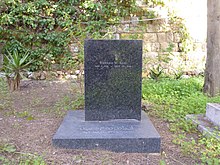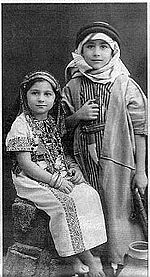Edward Said

Edward Wadie Said (إدوارد سعيد) (November 1, 1935 – September 24, 2003) was a well-known Palestinian-born American literary theorist, critic and outspoken Palestinian activist. According to Columbia News (Columbia University), he was "one of the most influential scholars in the world," and "was undoubtedly one of the greatest minds of the 20th century."
Life
Said was born in Jerusalem (then in the British Mandate of Palestine) to a Christian Arab family and raised in both Jerusalem and Cairo, Egypt. Until age 12, he lived between Cairo and West Jerusalem where he attended the Anglican St. Georges Academy in 1947. His family became refugees in 1948 just prior to the capture of West Jerusalem by Israeli forces.
At age 14, Said entered Victoria College in Cairo, and then Mount Hermon School in the United States. He received his B.A. from Princeton University and his M.A. and Ph.D. from Harvard University. He joined the faculty of Columbia University in 1963 and served as professor of English and Comparative Literature for several decades. Said also taught at Harvard, Johns Hopkins, and Yale universities. He spoke English and French fluently, excellent colloquial and very good standard Arabic, and was literate in Spanish, German, Italian and Latin. Said was bestowed numerous honorary doctorates from universities around the world and twice received Columbia's Trilling Award and the Wellek Prize of the American Comparative Literature Association.
Edward Said died at the age of 67 in New York after a long battle with chronic myelogenous leukemia.
Orientalism
Said is best known for describing and critiquing "Orientalism," that which he perceived as a constellation of false assumptions underlying Western attitudes toward the East. In Orientalism (1978), Said decried the "subtle and persistent Eurocentric prejudice against Arabo-Islamic peoples and their culture". [1] He argued that a long tradition of false and romanticized images of Asia and the Middle East in Western culture had served as an implicit justification for Europe's and America's colonial and imperial ambitions. Just as fiercely, he denounced the practice of Arab elites who internationalized the American and British orientalists' ideas of Arabic culture.
The British historian Bernard Lewis was among the scholars whose work Said had questioned in Orientalism and subsequent works. The two authors came to frequently exchange polemics, beginning in the pages of the New York Review of Books following the publication of Orientalism. Lewis' article, "The question of orientalism," was followed in the next issue by "Orientalism: an exchange."
Christopher Hitchens, a political columnist who had been a friend of Said and who had jointly edited and contributed to (Blaming the Victims: Spurious Scholarship and the Palestinian Question), became increasingly critical of Said, his political views, and his scholarship during the leadup to the United States-led Iraq War. In particular, Hitchens was among the supporters of pro-war Iraqi exile Ahmad Chalabi and the Iraqi National Congress; Said was against the war, and fiercely critical of Ahmad Chalabi and other exiles. In a public break, Hitchens complained that Said denied any possibility "that direct Western engagement in the region is legitimate" and that Said's analysis cast "every instance of European curiosity about the East [as] part of a grand design to exploit and remake what Westerners saw as a passive, rich, but ultimately contemptible 'Oriental' sphere". [2]
In his very last article (featured in Al-Ahram and Counterpunch), Edward Said issued a stinging rebuke to Hitchens. Said chastised "expatriate British journalists in America..." whose thoughts amounted to "just racism at the bottom...no matter how dressed up it is." [3][4]
Activism

As a Palestinian activist, Said defended the rights of Palestinians in Israel and in what the international community calls the Palestinian Territories (the West Bank and the Gaza Strip).
Writing in 1980, Said anticipated an eventual policy of military aggression by the United States toward the Middle East, a prediction some observers find evident in the actions of the United States after the September 11, 2001 terrorist attacks:
- "So far as the United States seems to be concerned, it is only a slight overstatement to say that Moslems and Arabs are essentially seen as either oil suppliers or potential terrorists. Very little of the detail, the human density, the passion of Arab-Moslem life has entered the awareness of even those people whose profession it is to report the Arab world. What we have instead is a series of crude, essentialized caricatures of the Islamic world presented in such a way as to make that world vulnerable to military aggression." [5]
From 1977 until 1991, Said was an independent member of the Palestinian National Council who tended to stay out of factional struggles. He supported the two-state solution and voted for it in Algiers in 1988. He quit the PNC over the decision by Yasser Arafat and the PLO to support Saddam Hussein in the Gulf War, a decision he considered disastrous to the interests of Palestinian refugees living in Arab League member states who supported the American-led coalition. Thereafter, he became critical of the role of Arafat in the process leading up to the signing of the Oslo Accords in 1993, feeling that the Oslo terms were unacceptable and had been rejected by the Madrid round negotiators. He felt that Oslo would not lead to a truly independent state and was inferior to a plan Arafat had rejected when Said himself presented it to Arafat on behalf of the US government in the late 70's. In particular, he wrote that Arafat had sold short the right of Palestinian refugees to return to their homes in pre-1967 Israel and ignored the growing presence of Israeli settlements. He came to prefer and support the binational solution - the creation of one state in the entirety of the West Bank, Gaza Strip and pre-1967 Israel, in which Arabs and Jews would have equal rights over a two state solution with a Palestinian state on the West Bank, Gaza and East Jerusalem.
- "I have spent a great deal of my life during the past 35 years advocating the rights of the Palestinian people to national self-determination, but I have always tried to do that with full attention paid to the reality of the Jewish people and what they suffered by way of persecution and genocide. The paramount thing is that the struggle for equality in Palestine/Israel should be directed toward a humane goal, that is, co-existence, and not further suppression and denial." [6]
His relationship with the Palestinian Authority was so bad that PA leaders banned the sale of his books in August 1995, but improved when he hailed Arafat for rejecting Barak's offers at the Camp David 2000 Summit.
In June 2002, Said, along with Haidar Abdel-Shafi, Ibrahim Dakak, and Mustafa Barghouti, helped establish the Palestinian National Initiative, or Al-Mubadara, an attempt to build a third force in Palestinian politics, a democratic, reformist alternative to both the established Palestinian Authority and to Islamist militant groups such as Hamas.
Said's books on the issue of Israel and Palestine include The Question of Palestine (1979), The Politics of Dispossession (1994) and The End Of The Peace Process (2000).
Said was also a prolific journalist and his writing regularly appeared in The Nation, The Guardian, the London Review of Books, Le Monde Diplomatique, Counterpunch, Al Ahram, and the pan-Arab daily al-Hayat.
A skilled concert pianist, Said also contributed music criticism to The Nation for many years. In 1999, he jointly founded the West-East Divan Orchestra with the Argentine-Israeli conductor Daniel Barenboim.
Books
- After the Last Sky (1986)
- Beginnings (1975)
- Blaming the Victims (1988) [contributor and co-editor with Christopher Hitchens]
- CIA et Jihad, 1950-2001: Contre l'URSS, une désastreuse alliance (2002), with John K. Cooley
- Covering Islam (1981)
- Criticism in Society
- Culture and Imperialism (1993)
- The End Of The Peace Process (2000)
- Humanism and Democratic Criticism (2005)
- Edward Said: A Critical Reader
- Freud and the Non-European
- Jewish Religion, Jewish History (Introduction)
- Joseph Conrad and the Fiction of Autobiography (1966)
- Literature and Society (1980)
- Musical Elaborations (1991)
- Nationalism, Colonialism, and Literature
- Orientalism (1978)
- Orientalisme (1980)
- Out of Place (1999) (a memoir)
- Parallels and Paradoxes (with Daniel Barenboim)
- The Pen and the Sword (1994)
- The Politics of Dispossession (1994)
- The Question of Palestine (1979)
- Reflections on Exile (2000)
- Representations of the Intellectual (1994)
- The World, the Text and the Critic (1983)
External links
- Columbia News mourns passing of Edward Said
- The Edward Said Archive, unofficial site
- Edward Said index on The Electronic Intifada
- Edward Said dossier (Le Monde diplomatique)
- Bibliography or reviews
- South End Press, Said's South End Press titles and a brief bio
- Islam Through Western Eyes, article by Said explaining the essential thesis of Orientalism
- Remembering Edward Said, obituary
- Zmag.org/Middle East Watch, several remembrances
- A Mighty and Passionate Heart, obituary by Alexander Cockburn on Counterpunch
- Edward, a remembrance by Dr. Hanan Ashrawi
- Al-Ahram, obituary and links to all of Said's columns in that newspaper
- More Links by R. Lichtensteiger
- Tribute and archive of Democracy Now! appearances
- "Writing to the moment" Review of Said's work, at the occasion of the anniversary of his death (The Guardian)
- "Edward W. Said, 1935 - 2003" Remembrance of Said on 1st anniversary of his death at 3 Quarks Daily
- Edward Said's Splash Said's impact on Middle Eastern studies, by Martin Kramer.
- Talk at Berkeley on Palestine and the universality of Human Rights Part 1, Part 2 from tucradio.org
